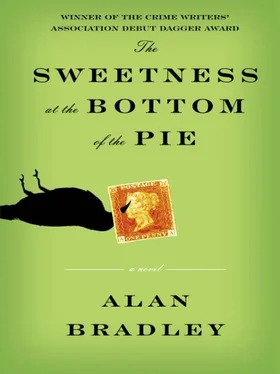Alan Bradley - The Sweetness at the Bottom of the Pie
Здесь есть возможность читать онлайн «Alan Bradley - The Sweetness at the Bottom of the Pie» весь текст электронной книги совершенно бесплатно (целиком полную версию без сокращений). В некоторых случаях можно слушать аудио, скачать через торрент в формате fb2 и присутствует краткое содержание. Жанр: Старинная литература, на английском языке. Описание произведения, (предисловие) а так же отзывы посетителей доступны на портале библиотеки ЛибКат.
- Название:The Sweetness at the Bottom of the Pie
- Автор:
- Жанр:
- Год:неизвестен
- ISBN:нет данных
- Рейтинг книги:3 / 5. Голосов: 1
-
Избранное:Добавить в избранное
- Отзывы:
-
Ваша оценка:
- 60
- 1
- 2
- 3
- 4
- 5
The Sweetness at the Bottom of the Pie: краткое содержание, описание и аннотация
Предлагаем к чтению аннотацию, описание, краткое содержание или предисловие (зависит от того, что написал сам автор книги «The Sweetness at the Bottom of the Pie»). Если вы не нашли необходимую информацию о книге — напишите в комментариях, мы постараемся отыскать её.
The Sweetness at the Bottom of the Pie — читать онлайн бесплатно полную книгу (весь текст) целиком
Ниже представлен текст книги, разбитый по страницам. Система сохранения места последней прочитанной страницы, позволяет с удобством читать онлайн бесплатно книгу «The Sweetness at the Bottom of the Pie», без необходимости каждый раз заново искать на чём Вы остановились. Поставьте закладку, и сможете в любой момент перейти на страницу, на которой закончили чтение.
Интервал:
Закладка:
"My home base is in London, of course, but I've been tramping through this part of the country for quite some time, scribbling in my notebooks. I'd rather hoped to have a look round the estate and interview your father. In fact, that's why I'm here.”
"I don't think that will be possible, Mr. Pemberton," I said. "You see, there's been a sudden death at Buckshaw, and Father is. assisting the police with their inquiries."
Without thinking, I had pulled the phrase from remembered serials on the wireless, and, until I said it, not realized its import.
"Good Lord!" he said. "A sudden death? Not one of the family, I hope."
"No," I said. "A complete stranger. But since he was found in the garden at Buckshaw, you see, Father is bound to—"
At that moment it stopped raining as suddenly as it had begun. The sun came out to play in rainbows on the grass, and somewhere on the island, a cuckoo sang, precisely as it does at the end of the storm in Beethoven's Pastoral Symphony. I swear it did.
"I understand perfectly," he said. "I wouldn't dream of intruding. Should Colonel de Luce wish to be in contact at a later date, I'm at the Thirteen Drakes, in Bishop's Lacey. I'm sure Mr. Stoker would be happy to convey a message."
I removed the cape and handed it to him.
"Thank you," I said. "I'd best be getting back."
We waded back across the lake together like a couple of bathers holidaying at the seaside.
"It was a pleasure meeting you, Flavia," he said. "In time, I trust we shall become fast friends."
I watched as he strolled across the lawn towards the avenue of chestnuts and out of sight.
11
I FOUND DAFFY IN THE LIBRARY, PERCHED AT THE very top of a wheeled ladder.
"Where's Father?" I asked.
She turned a page and went on reading as if I had never been born.
"Daffy?"
I felt my inner cauldron beginning to boil: that bubbling pot of occult brew that could so quickly transform Flavia the Invisible into Flavia the Holy Terror.
I seized one of its rungs and gave the ladder a good shake, and then a shove to start it rolling. Once in motion, it was easy enough to sustain, with Daffy clinging to the top like a paralyzed limpet as I pushed the thing down the long room.
"Stop it, Flavia! Stop it!"
As the doorway approached at an alarming rate, I braked, then ran round behind the ladder and raced off again in the opposite direction, and all the while, Daffy teetering away up top like the lookout on a whaler in a North Atlantic blow.
"Where's Father?" I shouted.
"He's still in his study with the Inspector. Stop this! Stop it!"
As she looked a little green about the gills, I stopped.
Daffy came shakily down the ladder and stepped gingerly off onto the floor. I thought for a moment she would lunge at me, but she seemed to be taking an unusually long while regaining her land legs.
"Sometimes you scare me," she said.
I was about to retort that there were times I scared myself, but then I remembered that silence can sometimes do more damage than words. I bit my tongue.
The whites of her eyes were still showing, like those of a bolted cart-horse, and I decided to take advantage of the moment.
"Where does Miss Mountjoy live?"
Daffy looked blank.
"Miss Library Mountjoy," I added.
"I have no idea," Daffy said. "I haven't used the library in the village since I was a child."
Still wide-eyed, she peered at me over her glasses.
"I was thinking of asking her advice on becoming a librarian."
It was the perfect lie. Daffy's look became almost one of respect.
"I don't know where she lives," she said. "Ask Miss Cool, at the confectionery. She knows what's under every bed in Bishop's Lacey."
"Thanks, Daff," I said as she dropped down into an upholstered wing back chair. "You're a brick."
ONE OF THE CHIEF CONVENIENCES of living near a village is that, if required, you can soon be in it. I flew along on Gladys, thinking that it might be a good idea to keep a logbook, as aeroplane pilots are made to do. By now, Gladys and I must have logged some hundreds of flying hours together, most of them in going to and from Bishop's Lacey. Now and then, with a picnic hamper strapped to her black back-skirts, we would venture even farther afield.
Once, we had ridden all morning to look at an inn where Richard Mead was said to have stayed a single night in 1747. Richard (or Dick, as I sometimes referred to him) was the author of A Mechanical Account of Poisons in Several Essays . Published in 1702, it was the first book on the subject in the English language, a first edition of which was the pride of my chemical library. In my bedroom portrait gallery, I kept his likeness stuck to the looking-glass alongside those of Henry Cavendish, Robert Bunsen, and Carl Wilhelm Scheele, whereas Daffy and Feely had pinups of Charles Dickens and Mario Lanza respectively.
The confectioner's shop in the Bishop's Lacey High Street stood tightly wedged between the undertaker's premises on one side and a fish shop on the other. I leaned Gladys up against the plate-glass window and seized the doorknob.
I swore curses under my breath. The place was locked as tight as Old Stink.
Why did the universe conspire against me like this? First the closet, then the library, and now the confectioner's. My life was becoming a long corridor of locked doors.
I cupped my hands at the window and peered into the interior gloom.
Miss Cool must have stepped out or perhaps, like everyone else in Bishop's Lacey, was having a family emergency. I took the knob in both hands and rattled the door, knowing as I did so that it was useless.
I remembered that Miss Cool lived in a couple of rooms behind the shop. Perhaps she had forgotten to unlock the door. Older people often do things like that: they become senile and—
But what if she's died in her sleep? I thought. Or worse…
I looked both ways but the High Street was empty. But wait! I had forgotten about Bolt Alley, a dark, dank tunnel of cobblestones and brick that led to the yards behind the shops. Of course! I made for it at once.
Bolt Alley smelled of the past, which was said to have once included a notorious gin mill. I gave an involuntary shiver as the sound of my footsteps echoed from its mossy walls and dripping roof. I tried not to touch the reeking green-stained bricks on either side, or to inhale its sour air, until I had edged my way out into the sunlight at the far end of the passage.
Miss Cool's tiny backyard was hemmed in with a low wall of crumbling brick. Its wooden gate was latched on the inside.
I scrambled over the wall, marched straight to the door, and gave it a good banging with the flat of my hand.
I put my ear to the panel, but nothing seemed to be moving inside.
I stepped off the walk, waded into the unkempt grass, and pressed my nose to the bottom of the sooty window-pane. The back of a dresser was blocking my view.
In one corner of the yard was a decaying doghouse—all that was left of Miss Cool's collie, Geordie, who had been run over by a speeding motorcar in the High Street.
I tugged at the sagging frame until it pulled free of the mounded earth and dragged it across the yard until it was directly under the window. Then I climbed on top of it.
From the top of the doghouse it was only one more step up until I was able to get my toes on the windowsill, where I balanced precariously on the chipped paint, my arms and legs spread out like Leonardo da Vinci's Vitruvian Man, one hand hanging on tightly to a shutter and the other trying to polish a viewing port in the grimy glass.
It was dark inside the little bedroom, but there was light enough to see the form lying on the bed; to see the white face staring back at me, its mouth gaping open in a horrid “O.”
Читать дальшеИнтервал:
Закладка:
Похожие книги на «The Sweetness at the Bottom of the Pie»
Представляем Вашему вниманию похожие книги на «The Sweetness at the Bottom of the Pie» списком для выбора. Мы отобрали схожую по названию и смыслу литературу в надежде предоставить читателям больше вариантов отыскать новые, интересные, ещё непрочитанные произведения.
Обсуждение, отзывы о книге «The Sweetness at the Bottom of the Pie» и просто собственные мнения читателей. Оставьте ваши комментарии, напишите, что Вы думаете о произведении, его смысле или главных героях. Укажите что конкретно понравилось, а что нет, и почему Вы так считаете.












